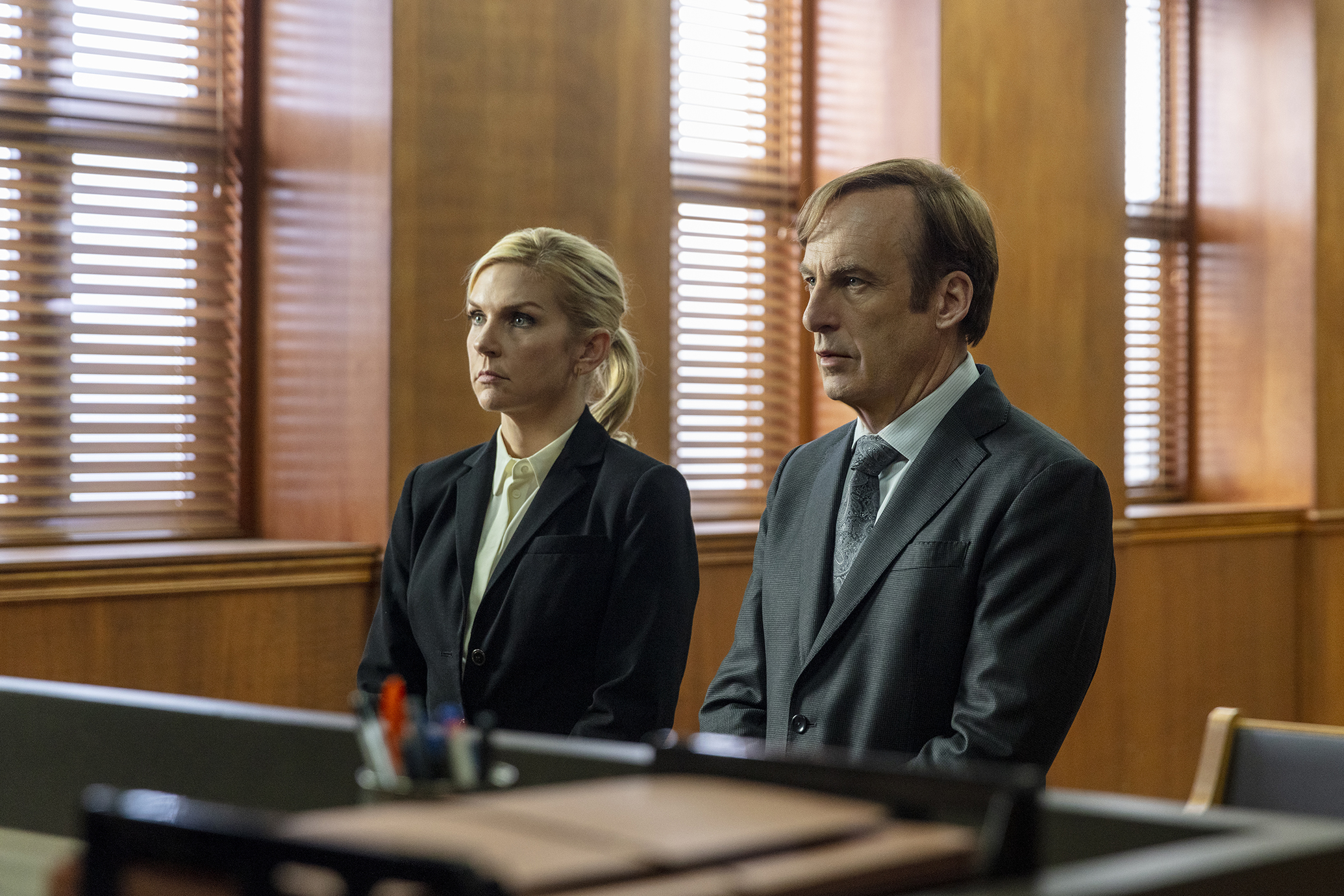Join or Sign In
Sign in to customize your TV listings
By joining TV Guide, you agree to our Terms of Use and acknowledge the data practices in our Privacy Policy.
Better Call Saul's Michael Mando Unpacks the First Major Tragedy of the Final Season
And reveals how Nacho's fate is entwined with Jesse Pinkman's
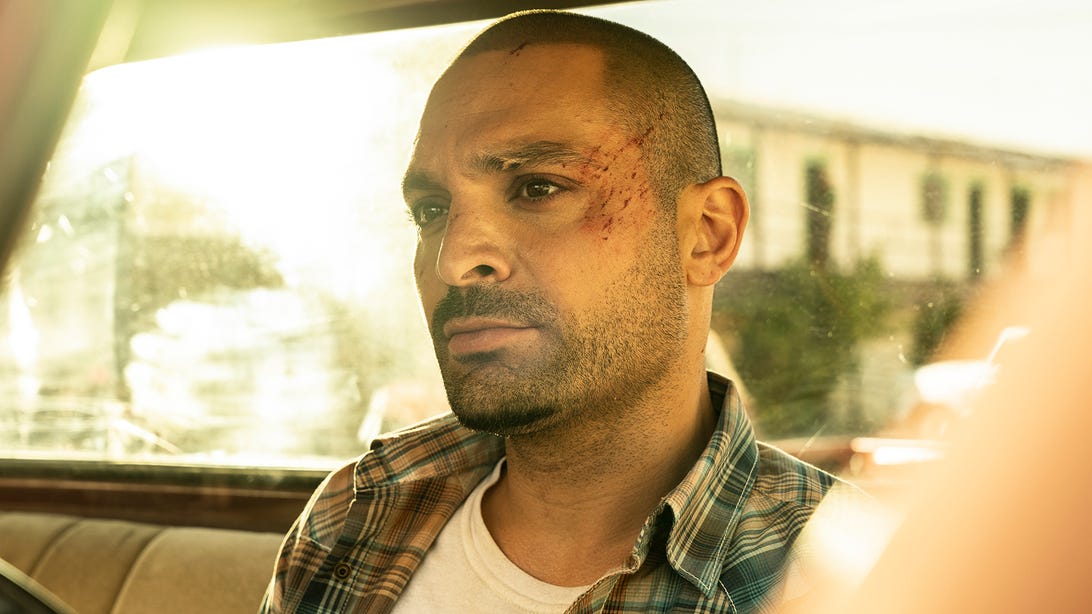
Michael Mando, Better Call Saul
Greg Lewis/AMC/Sony Pictures Television[Warning: The following contains major spoilers for Season 6, Episode 3 of Better Call Saul, "Rock and Hard Place." Read at your own risk!]
We were right to be worried about Nacho Varga. After the tormented cartel member, played by Michael Mando, was put through the physical and emotional wringer in the first three episodes of Better Call Saul's final season, the show's most tragic character met a tragic end in the final minutes of Monday's episode, "Rock and Hard Place," when he shot himself in the head.
The episode is a shocking, affecting hour that begins with Nacho going to dramatic lengths to evade the Salamanca twins (Daniel and Luis Moncada) and ends with him agreeing to sacrifice himself in exchange for a promise from Gus (Giancarlo Esposito) and Mike (Jonathan Banks) to ensure the safety of his father (Juan Carlos Cantú). In a last leap of faith, he goes rogue with a gun to his forehead in the middle of the desert, telling Hector (Mark Margolis) about everything he's done to the Salamanca family. He then escapes the zip ties he's been put in and steals Juan Bolsa's (Javier Grajeda) gun, which he ultimately turns on himself. Nacho's death is a turning point in a season already steeped in foreboding tension, alerting us to the very real fact that devastation is always just around the corner.
Still, Mando found hope in Nacho's tragic end. His last act is a selfless one that solidifies the safety of his dad, which has been Nacho's driving force since the series began. Mando caught up with TV Guide to discuss how Nacho's death scene came together, filming that last father-son phone call, and how he thinks Nacho's fate complements Jesse Pinkman's (Aaron Paul) fate in Breaking Bad.
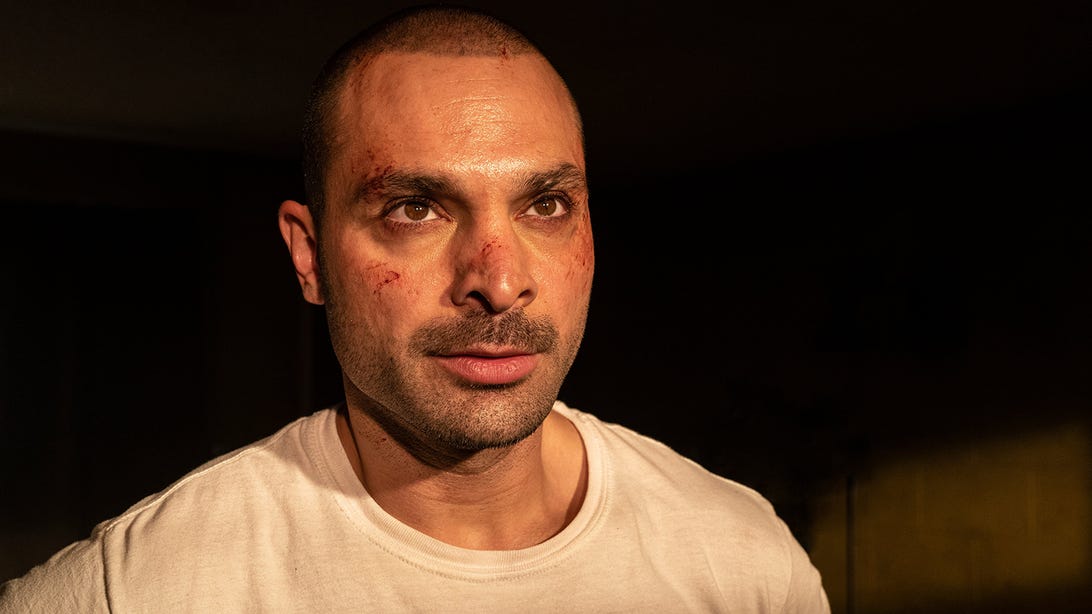
Michael Mando, Better Call Saul
Greg Lewis/AMC/Sony Pictures TelevisionThere was a big gap between the end of Season 5 and the start of Season 6. When did you learn that Nacho was going to die?
Michael Mando: At the end of Season 5, Nacho sits with Don Eladio, and instinctually, I played that conversation knowing that Nacho was definite about breaking good, and feeling that the whole show was going to break bad. I think intuitively I knew that this decision was going to put me in a very difficult spot.
What kinds of conversations did you have with [co-creators] Vince Gilligan and Peter Gould leading into this season?
Mando: They called me in the winter leading up to the shoot. I was in Montreal, and they said to me, "We're going to call upon you for a tour de force performance. It's going to be like a feature film. It's going to be physical. It's going to be emotional, psychological, and spiritual. Are you up for it?" And I said, "I've been dreaming about it."
What was your reaction to learning that Nacho sacrificed himself for his dad?
Mando: You know, it's not when you go, but it's why you go. Why you go, and your relationship to that departure. He approaches that moment, for the first time in the whole series, being whole, and being 100% on his own, but being 100% comfortable with that. Peter Gould said it best when he said Nacho is the only character who transcends himself, and transcends his situation, and enters this sort of realm that is beyond the material world.
That last phone call between Nacho and his dad is so quietly heartbreaking. I'm always interested in how phone calls are filmed, because I know characters' dialogue obviously has to be shot separately, but there were so many layers in your performance and in Juan Carlos Cantú's performance. What was it like to film that call?
Mando: Part of Nacho's glory and tragedy is that he never tells his father all the things he's going through to save him. Juan Carlos Cantú, a wonderful friend and actor, did not read the scripts, he didn't have access to the scripts. So I thought it was best if he didn't know what I was going through, and I decided that he wouldn't be in the room with me. I was reading off of our A.D. Rich [T. Sickler]. And Juan Carlos asked me to be there for his reading, so I was there for his coverage, but he wasn't there for mine. I think it helped us both.
So he had no idea what was happening to Nacho in that moment?
Mando: No, he couldn't see my face. He didn't know what I looked like, where I was, what I had gone through, he had no idea. And I think it was just right.
I want to go back to the death scene. How long did that take to shoot?
Mando: That whole episode was filled with these kind of larger-than-life symbols. For example, right before my first day of shooting, I cut my thumb really deep, and had to be taken to the hospital. I couldn't feel my whole left arm that night, I felt like I was having a heart attack. I couldn't shoot for about a week and a half, so they started shooting everybody else. The day we were in the desert for that final scene, right before they turned the coverage on Nacho, a huge sandstorm hit, and we were literally rushed out. Our cars got stuck. When I got home that night, lightning struck the tree in front of my house and fell, and I couldn't get into my driveway. And then the next day when I showed up, [episode director and writer] Gordon Smith had this brilliant idea for me to play that scene in a very different way than the way that I had the night before. So, we wouldn't have had that scene had it not been for that sandstorm.
That's insane. How were you playing it the night before and what change in direction did Gordon give you?
Mando: We approached it initially as Nacho was taking his revenge and getting to say his piece. On the second day, we realized, and thanks to Gordon, who brought it to my attention, that this wasn't so much an "eff you" monologue. It was that Nacho was still doing it for his father. Nacho wasn't just speaking to the spectators who were all eventually dead. They're all dead men walking, but he was speaking to that open sky. He was speaking to God, he was speaking to where he was going next. He was doubling down on his beliefs that to live and protect innocent lives is superior to greed and evil.
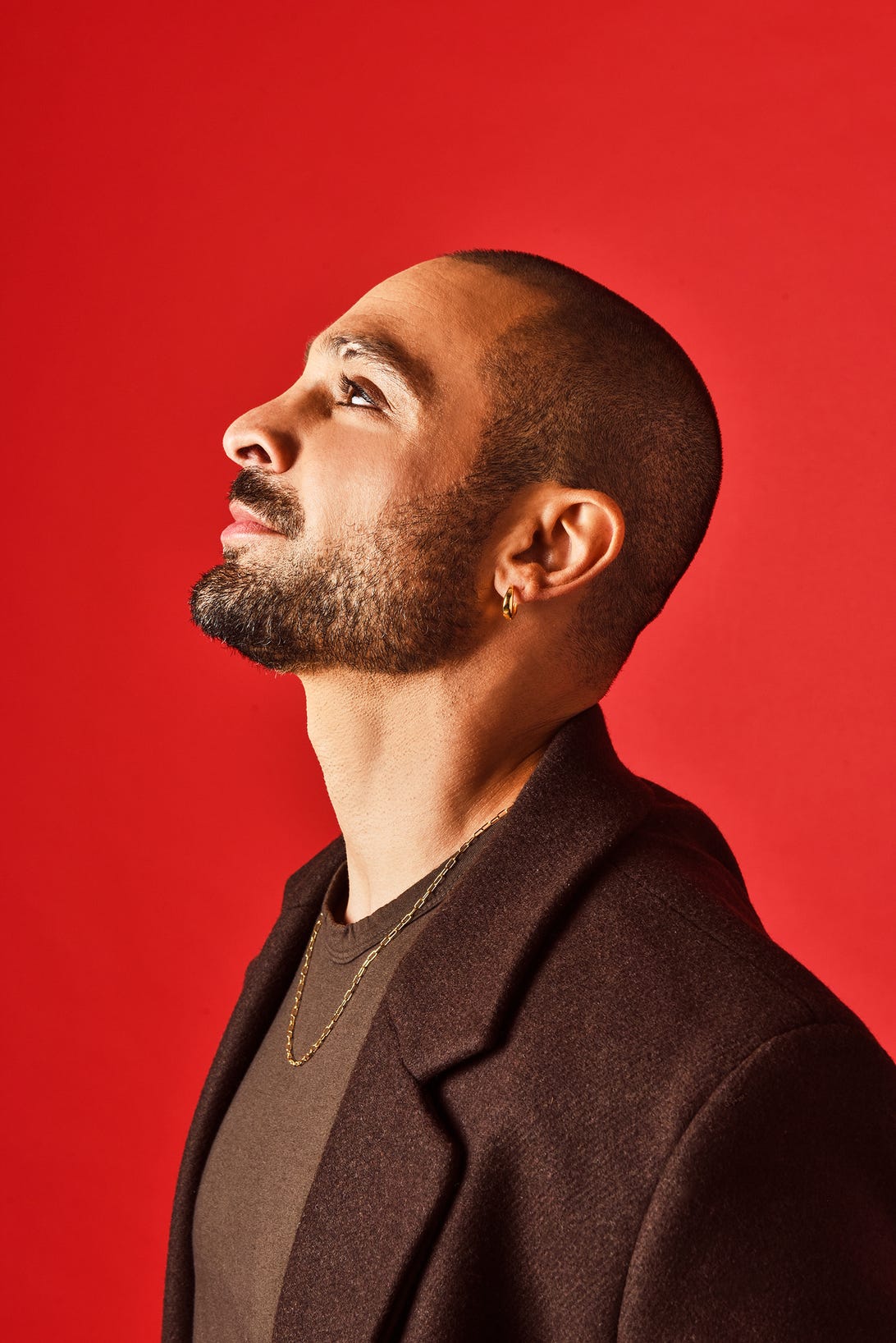
Michael Mando
Irvin RiveraI love that he gets his monologue at the end where he gets to tell Hector what he did. That moment felt so significant to me because, and correct me if I'm wrong, but Nacho doesn't often get truly, honestly angry like that. How did you get to that emotional place?
Mando: It's really weird, but the undertone of it all, to me, really was the love for his father. He's a human being, and he has his doubts about death and the afterlife. I mean, at the gas station, he's free. He's won, and he can run into the sunset. He chooses to turn around, and that phone call essentially is, "I love you, come with me." That's the subtext. He chooses to walk back through hell to protect this father. It's very Shakespearean. It's tragic and it's heroic at the same time, which together makes it romantic.
The final trial at the end, where it's like the ancient Egyptians — they used to weigh the dead man's heart against the weight of a feather, and if the person's heart was lighter than the feather, then they ascended into heaven. To ascend into heaven, you have to die with no regrets and no second doubts. Nacho goes to that sort of divine trial without ever second guessing that he will die there. That's why he takes the piece of glass. Because he's going to assure one thing and one thing only: that he's going to trade his life for the absolute safety of his father. That's what that moment is.
He also tells Hector he'd set Lalo up all over again if he could. Do you think that's true? Do you think Nacho had any regrets about what he did to the Salamancas?
Mando: Well, the Salamancas attacked him first. Tuco was going around killing people for fun, and had shot this guy, and Nacho had a piece of that guy's skull in his collarbone in Season 2. And then Hector Salamanca was threatening his father's life to forcefully take over his business. The Salamancas never treated Nacho like family. They were literally just using him. I mean, they thought his possible death was entertaining and fun.
You can only betray somebody that you have an honest relationship with. The Salamancas, starting from Tuco to Hector to the twins to Lalo, really don't care for Nacho's life, to the point that they don't even respect him. You can't betray someone that has no respect for your life, or no respect for your father's life. At the end of Season 5, Nacho does the most loyal gesture that anyone on the show has ever done. He actually declares his cards openly, and in the most dangerous territory, and he declares his loyalty to Mike Ehrmantraut. He's the only one who openly picks a side. I think the character of Nacho was actually incredibly loyal, and has always been loyal to Mike from the very beginning. He's always delivered on every single thing, if you go all the way back to Season 1. He's always kept his word. You have to put loyalty in context, and you have to be loyal to the right thing. Nacho's loyal to virtue, he's loyal to honest conversation, to people who are willing to reciprocate respect.
I was really warmed by the moment where Mike poured Nacho a drink and they just stood together in silence, especially in light of Mike leading Nacho to death. How do you think Nacho feels about Mike in the end?
Mando: It's so hard for me to separate my relationship with Jonathan Banks with [Nacho's] relationship with Mike. My father, God rest his soul, passed away last year, and Jonathan Banks knew my dad, and had written my dad a postcard while my dad was dealing with terminal cancer. There's so much subtext there that it's almost impossible for me to talk about it. It's this weird world where life and art are kind of intermingling in very profound ways. I don't mean that it's too much in the sense that I don't want to talk about it. I mean it's too much in the sense that I don't think I sub-textually was able to process it. It was more like there was so much feeling in those moments, more than I could put into words.
I read that you did your own stunts this season. There was so much harrowing physical stuff you had to do.
Mando: Yeah. Doing your own stunts is something that I really fell in love with. These whole three episodes felt like an action feature film. I welcomed that, I loved it.
You fit really well into the whole action movie vibe.
Mando: My mom's going to be happy reading that. It was so much fun. I just love that this character becomes iconoclastic. When he starts off, he's kind of like this really intelligent, mysterious criminal. And then towards the end of the show, he's the only character breaking good in this whole universe, maybe other than Jesse Pinkman, and they're very different. They're very, very different characters, they symbolize very different things. And to get to do my own stunts, and to do it all in the name of love to save my father, for Peter and Vince to allow the character the opportunity to win and to essentially be free, and then for him to willingly walk back through the fire… It's a dream role. I just feel so grateful that this character is now part of pop culture.
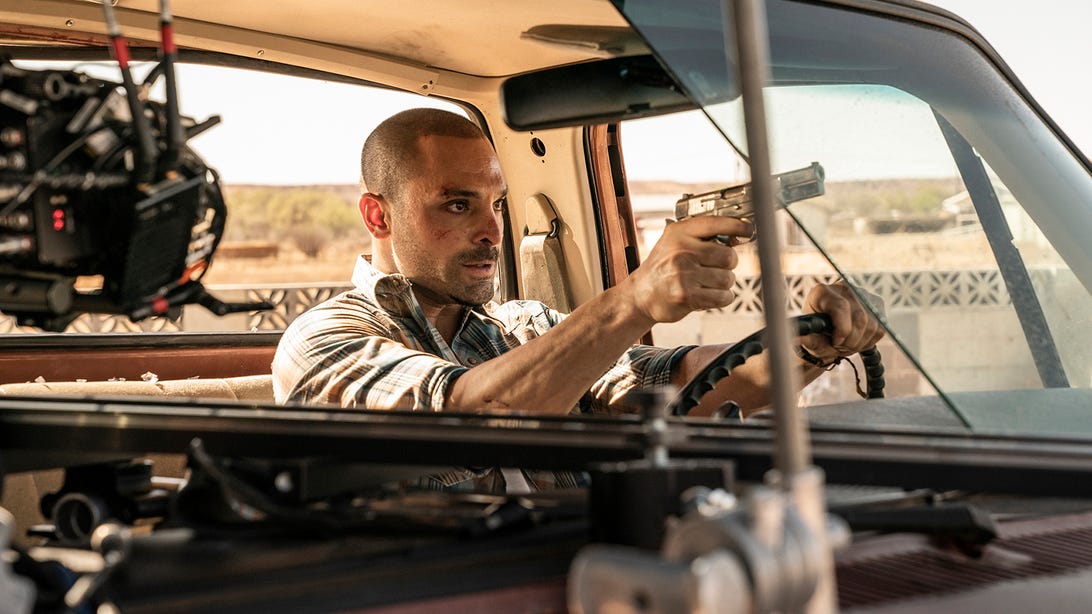
Michael Mando, Better Call Saul
AMCYou brought up Jesse. There are obviously so many parallels between him and Nacho, even though they are very different characters. Jesse's ending ultimately feels hopeful, while Nacho's obviously ends tragically, and both of their endings are very meaningful to their respective series. What do you think Nacho's death signifies about the rest of the season?
Mando: What I can tell you is that there are fan theories out there from reporters that I've spoken to. They were telling me that they believe that the reason why Jesse and Walter White were spared by Gus and Mike was because of Nacho's death. In other words, the impact his passing had on Mike and Gus must have changed their approach to people who seemed virtuous and moral. In a way, their destinies are intertwined. What I love about the character of Nacho is when you first meet him, he saves the lives of three people, Saul Goodman and the two skaters. And then when we last meet him, he saves the life of one more, his father, and impacts the relationships in the future with Jesse and Mike. Mike at some point in Breaking Bad says, "I had a guy. You're not that guy." And you can only imagine he must be speaking about Nacho.
You spoke to my colleague Kelly Connolly back in 2020, which was before you got these scripts, and you said you thought of Nacho's story as a story of emancipation. Do you still feel that way in light of his death?
Mando: I think it's a story about transcendence. I think it's about a man who transcends impossible circumstances, about a man whose tragic fate is written from the very beginning. But who finds absolute peace, wholeness, and love in his passing, and who does it on the biggest stage.
In Season 1, I was so interested in breaking the archetype of the gangster. What I was really interested in my conversations with Gordon Smith was protecting the integrity of the character of Nacho, and giving popular culture a new and fresh take on what it is to be brave and breaking away from the typical greed and power sort of objective, and adding a layer that is beyond that. Nacho gets offered everything. He essentially makes it to the top, and he gets all the money he can dream of all, the cars, all the attention he can dream of, but he chooses to do something that is based in virtue and morality. To me, that's the thing that I'm most proud of for this character.
Do you have any final thoughts about Nacho and his story?
Mando: The outpouring of fans on the streets, in restaurants, on social media, has just filled me up with a tremendous amount of gratitude. This journey at times was very dark and very difficult, and to come out of it with, just like Nacho, a sense of transcendence, and of feeling whole, and of liberating that character in the world, and he accomplishes his super objective, and transcends his environment. It's beautiful, and it's larger than life.
Better Call Saul airs Mondays at 9/8c on AMC.
